- Welcome to WestCoastAftershock Online Forum.
Recent posts
#31
General Non-Music Discussion / South Korea’s domestic tumult...
Last post by jon.wallace - May 07, 2025, 01:48 AMSouth Korea's domestic tumult risks being exploited by China
South Korea's domestic tumult risks being exploited by China
Expert comment
jon.wallace
10 April 2025
Beijing will see the removal of South Korea's president and subsequent election as an opportunity to undermine Seoul's alliances, at a time of rising tensions with the US.
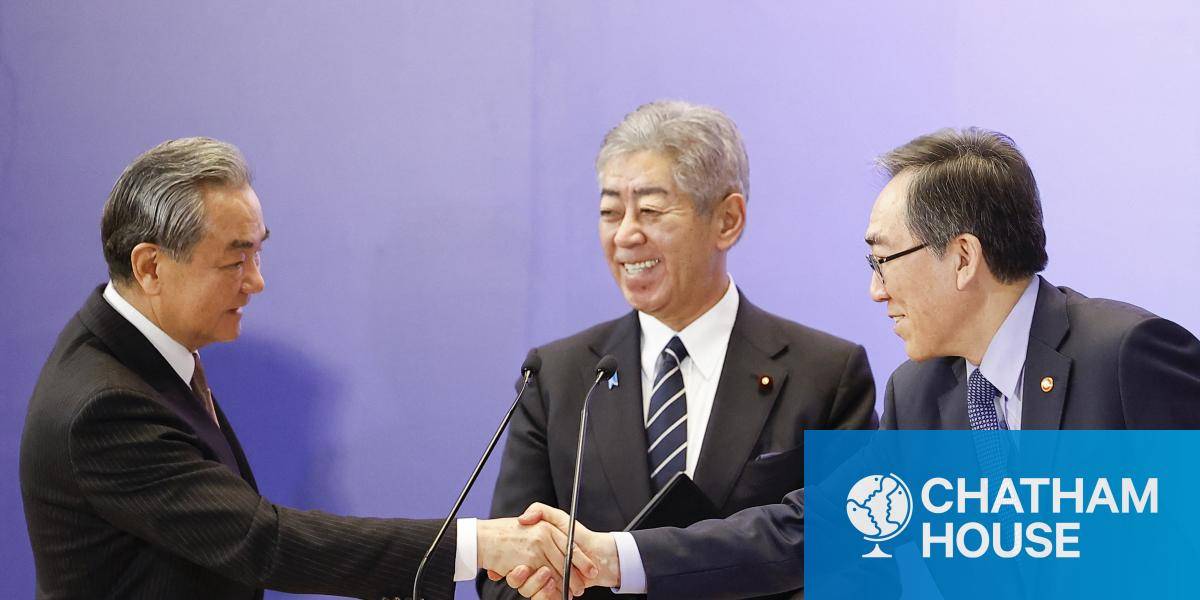
One week ago, South Korea's constitutional court voted to remove the country's now-former President Yoon Suk Yeol, following his initial impeachment by the national assembly on 14 December 2024. Preparations are now underway for the snap election of a new president, which will be held on 3 June.
Amidst ongoing political division in South Korea, Yoon's dismissal will have serious consequences for Seoul's foreign policy, especially at a time of heightened competition between Washington and Beijing. South Korea's politics is increasingly polarized, and China will wish to exploit this division to undermine a crucial US alliance.
South Korea's next steps
Yoon is the third South Korean president to be impeached – following Roh Moo-hyun and Park Geun-hye in 2004 and 2016 respectively – and the second to be removed from office by the country's constitutional court. His battles are just beginning, as he continues to face criminal charges – separate to his impeachment – pertaining to 'inciting insurrection'.
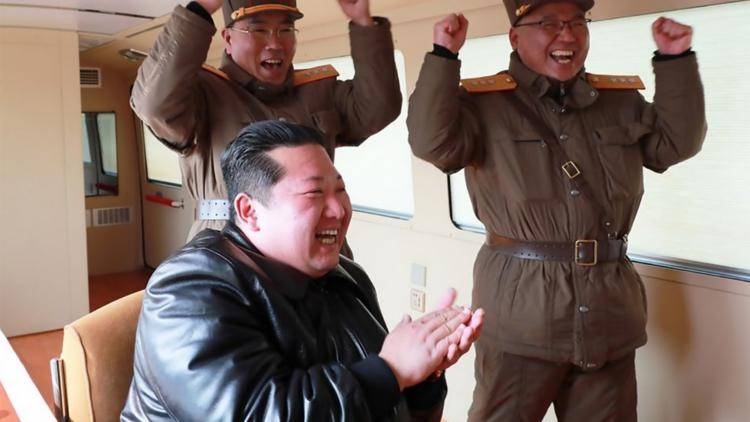
The World Today
Related content
South Korea's crisis leaves Kim Jong Un stronger than ever
Yoon maintains significant domestic support. In the weeks following his December impeachment, as opposition parties called for his arrest, his approval ratings notably soared, reaching just over 50 per cent in early February . At the same time, protests have continued in support of and against the now-former president.
Last week's verdict has now set in motion a nearly two-month campaigning period before the general election. The main political parties will look to hold primaries later this month.
Democratic processes have been – and are being – followed in South Korea. That said, Yoon's sudden and surprising declaration of martial law on 3 December 2024 – the first such occurrence in democratic South Korea – has adversely affected the country's international reputation and contributed to the intensifying political polarization at home.
Continuity and change in South Korea
Yoon's removal from power occurs at a precarious juncture in global politics. Thus far, the second administration of US President Donald Trump has adopted a transactional approach to diplomacy, which raises questions about the US's commitment to South Korea and the durability of Seoul's bilateral and trilateral ties with Tokyo and Washington.
Yoon's...foreign policy significantly bolstered ties between Seoul, Tokyo, and Washington.
Yoon's unfinished presidential term was mired in scandal, not least involving his wife, Kim Keon-hee . Nevertheless, his foreign policy significantly bolstered ties between Seoul, Tokyo, and Washington. The trilateral summit at Camp David in August 2023 was a notable achievement for multilateralism, with all three states committing to strengthen relations in the face of common threats from the Indo-Pacific region.
Only months before the summit, Yoon signed the Washington Declaration with former US President Joe Biden, agreeing to increase US-South Korean defence cooperation, including a new Nuclear Consultative Group. The group aimed to manage the nuclear threats from North Korea through enhanced coordination and consultation on nuclear and strategic planning.

Related content
How South Korea's turmoil will reverberate beyond its borders
With Yoon's removal, however, not one of the leaders who attended the Camp David Summit remains in power. Moreover, the Trump administration's somewhat unpredictable foreign policy renders South Korea's future relations with its regional and global allies and partners increasingly uncertain.
During his 2024 election campaign, Trump called for Seoul to pay more for the deployment of US troops in the country.
Whilst any withdrawal of these forces looks unlikely, assumptions about the US's regional security architecture in East Asia are being challenged.
China's exploitation of South Korea's domestic politics
The US is unlikely to abandon its South Korean ally completely. Yet these changes to South Korea's domestic and global environment will not go unnoticed in China. Beijing will likely seek to exploit the situation to its advantage.
On 30 March, the finance ministers of China, Japan, and South Korea met for their first dialogue in five years . The three countries agreed to hold 'comprehensive and high-level' talks with respect to a possible free trade agreement, although rumours that they would consider a joint response to US tariffs were quickly refuted by the South Korean government.
Tariffs pose a significant threat to South Korean businesses, particularly its automobile industry.
Japan, South Korea, and China were all surprised by the scale of the reciprocal tariff regime which the US president announced on 2 April, only days after the trilateral meeting took place. Tariffs pose a significant threat to South Korean businesses, particularly its automobile industry: in 2024 alone, South Korea's automobile exports to the US amounted to a far-from-paltry total of nearly $35 billion , accounting for 42 per cent of Seoul's total exports to the US.
Trump subsequently 'paused ' the imposition of these heightened tariffs on Japan, South Korea, and other countries, and instead maintained a flat 10 per cent tariff on all imports to the US, whilst escalating tariffs on China.
Source: https://www.chathamhouse.org/2025/04/south-koreas-domestic-tumult-risks-being-exploited-china Apr 10, 2025, 12:52 PM
South Korea's domestic tumult risks being exploited by China
Expert comment
jon.wallace
10 April 2025
Beijing will see the removal of South Korea's president and subsequent election as an opportunity to undermine Seoul's alliances, at a time of rising tensions with the US.

One week ago, South Korea's constitutional court voted to remove the country's now-former President Yoon Suk Yeol, following his initial impeachment by the national assembly on 14 December 2024. Preparations are now underway for the snap election of a new president, which will be held on 3 June.
Amidst ongoing political division in South Korea, Yoon's dismissal will have serious consequences for Seoul's foreign policy, especially at a time of heightened competition between Washington and Beijing. South Korea's politics is increasingly polarized, and China will wish to exploit this division to undermine a crucial US alliance.
South Korea's next steps
Yoon is the third South Korean president to be impeached – following Roh Moo-hyun and Park Geun-hye in 2004 and 2016 respectively – and the second to be removed from office by the country's constitutional court. His battles are just beginning, as he continues to face criminal charges – separate to his impeachment – pertaining to 'inciting insurrection'.

The World Today
Related content
South Korea's crisis leaves Kim Jong Un stronger than ever
Yoon maintains significant domestic support. In the weeks following his December impeachment, as opposition parties called for his arrest, his approval ratings notably soared, reaching just over 50 per cent in early February . At the same time, protests have continued in support of and against the now-former president.
Last week's verdict has now set in motion a nearly two-month campaigning period before the general election. The main political parties will look to hold primaries later this month.
Democratic processes have been – and are being – followed in South Korea. That said, Yoon's sudden and surprising declaration of martial law on 3 December 2024 – the first such occurrence in democratic South Korea – has adversely affected the country's international reputation and contributed to the intensifying political polarization at home.
Continuity and change in South Korea
Yoon's removal from power occurs at a precarious juncture in global politics. Thus far, the second administration of US President Donald Trump has adopted a transactional approach to diplomacy, which raises questions about the US's commitment to South Korea and the durability of Seoul's bilateral and trilateral ties with Tokyo and Washington.
Yoon's...foreign policy significantly bolstered ties between Seoul, Tokyo, and Washington.
Yoon's unfinished presidential term was mired in scandal, not least involving his wife, Kim Keon-hee . Nevertheless, his foreign policy significantly bolstered ties between Seoul, Tokyo, and Washington. The trilateral summit at Camp David in August 2023 was a notable achievement for multilateralism, with all three states committing to strengthen relations in the face of common threats from the Indo-Pacific region.
Only months before the summit, Yoon signed the Washington Declaration with former US President Joe Biden, agreeing to increase US-South Korean defence cooperation, including a new Nuclear Consultative Group. The group aimed to manage the nuclear threats from North Korea through enhanced coordination and consultation on nuclear and strategic planning.

Related content
How South Korea's turmoil will reverberate beyond its borders
With Yoon's removal, however, not one of the leaders who attended the Camp David Summit remains in power. Moreover, the Trump administration's somewhat unpredictable foreign policy renders South Korea's future relations with its regional and global allies and partners increasingly uncertain.
During his 2024 election campaign, Trump called for Seoul to pay more for the deployment of US troops in the country.
Whilst any withdrawal of these forces looks unlikely, assumptions about the US's regional security architecture in East Asia are being challenged.
China's exploitation of South Korea's domestic politics
The US is unlikely to abandon its South Korean ally completely. Yet these changes to South Korea's domestic and global environment will not go unnoticed in China. Beijing will likely seek to exploit the situation to its advantage.
On 30 March, the finance ministers of China, Japan, and South Korea met for their first dialogue in five years . The three countries agreed to hold 'comprehensive and high-level' talks with respect to a possible free trade agreement, although rumours that they would consider a joint response to US tariffs were quickly refuted by the South Korean government.
Tariffs pose a significant threat to South Korean businesses, particularly its automobile industry.
Japan, South Korea, and China were all surprised by the scale of the reciprocal tariff regime which the US president announced on 2 April, only days after the trilateral meeting took place. Tariffs pose a significant threat to South Korean businesses, particularly its automobile industry: in 2024 alone, South Korea's automobile exports to the US amounted to a far-from-paltry total of nearly $35 billion , accounting for 42 per cent of Seoul's total exports to the US.
Trump subsequently 'paused ' the imposition of these heightened tariffs on Japan, South Korea, and other countries, and instead maintained a flat 10 per cent tariff on all imports to the US, whilst escalating tariffs on China.
Source: https://www.chathamhouse.org/2025/04/south-koreas-domestic-tumult-risks-being-exploited-china Apr 10, 2025, 12:52 PM
#32
General Non-Music Discussion / US ownership of TikTok won’t ...
Last post by thilton.drupal - May 07, 2025, 01:48 AMUS ownership of TikTok won't protect democracies from digital threats
US ownership of TikTok won't protect democracies from digital threats
Expert comment
thilton.drupal
9 April 2025
Concerns over foreign-owned platforms may overshadow deeper-rooted threats in the global information environment. Beyond platform ownership, the US and other democracies need coordinated and consistent policy, aligned with democratic values.
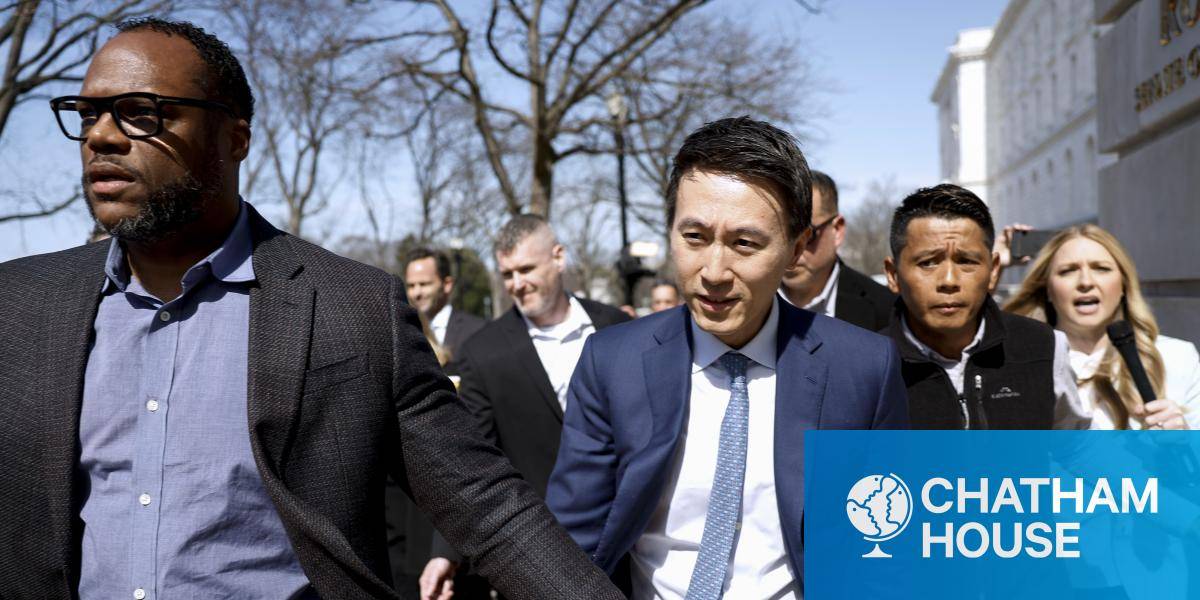
Last weekend, US President Donald Trump extended the 5 April deadline for TikTok to sell its assets to a US owner or face a nationwide ban, the second time he has postponed the ultimatum facing the popular Chinese-owned social media platform since returning to office.
The delay followed a desperate scramble between ByteDance (TikTok's Chinese parent company), prospective buyers and the administration to reach a deal. TikTok is not short on admirers: with over 135 million active users in the US, for many Americans, TikTok is the go-to platform for news, culture and entertainment.
But the Protecting Americans from Foreign Adversary Controlled Applications Act – passed with bipartisan support in April 2024 – issued a firm ultimatum to the platform: sell up, or be banned, citing significant threats to national security. Taking place against the backdrop of the intensifying US-China technology race, the order comes after years of US concern over Chinese-owned platforms and technologies.
The debate over TikTok's influence has exposed many weaknesses at the heart of US democracy and its information environment, but banning or changing the platform's ownership alone will not fix these deep-rooted problems.
These constraints reflect a longstanding US policy belief shared by President Trump: that domestic control over digital platforms and emerging technologies helps guarantee safety, security, prosperity and sovereignty. Trump even suggested that the TikTok deal could be used as a bargaining chip in tariff negotiations.
TikTok in the crosshairs
Washington's focus on TikTok's Chinese ownership as a security concern is not new. US policymakers on both sides of the aisle have had longstanding concerns over the platform's collection, storage and processing of data on US users, with anxieties over potential 'backdoor' channels enabling the Chinese Communist Party (CCP) to weaponize extensive user data.
In 2022, TikTok sought to assuage concerns by working with Texas-based Oracle to move the default storage location of US user data to their cloud infrastructure. But in March 2023, a relentless congressional hearing with Singaporean TikTok CEO Shou Zi Chew showed how pervasive security concerns remained. While Chew has insisted that 'ByteDance is not owned or controlled by the Chinese government,' he has also confirmed that the company's engineers had access to some user data, which stoked bipartisan fears of Chinese technology and influence.
ByteDance by no means operates free from CCP influence. In 2021, Beijing formalized its board influence over a ByteDance entity and for years, China's digital regulator has enforced strict content guidelines on Douyin, the Chinese version of TikTok. Human rights groups have criticized the CCP's often heavy-handed influence over technology companies and the intimidation of their CEOs.
Regardless of who owns TikTok, the platform's design features can be exploited for influence campaigns and the amplification of content stoking divisions and targeting democratic values.
A lack of transparency makes it challenging to gauge the CCP's actual sway over TikTok outside Chinese borders and whether, in the words of former US Secretary of State Mike Pompeo, the platform is truly one of several 'Trojan horses for Chinese intelligence'. TikTok's ownership has also caused concerns in other countries, playing into fears that data collected by foreign-owned platforms could be weaponized to target their political systems – both a real risk and a source of panic. Pointing to scandals like Meta's legal settlement over a data breach linked to the Cambridge Analytica consultancy firm, Chew himself noted that US companies might be subject to similar criticism .
While a US company taking control of TikTok might placate Washington, it may not reassure other jurisdictions. In Westminster, concerns about online safety and harms – and particularly the protection of children online – remain the primary driver of action against platforms. For the EU, the misuse of platforms for disseminating disinformation targeting democratic integrity – including by groups linked to Russia and China – remains the biggest concern, stoked once again by alleged foreign interference via TikTok in the annulled Romanian presidential elections.
Door locked, window open?
Enforcing a handover in TikTok's ownership addresses some US national security concerns but is not a silver bullet for foreign interference and influence over digital platforms.
Regardless of who owns TikTok, the platform's design features can be exploited for influence campaigns and the amplification of content stoking divisions and targeting democratic values. In the US, TikTok is just one platform within an intensely polluted information environment, increasingly mediated by the unprecedented conflation of technology companies with political power. The country has now suffered through three elections where voters have confronted rife misinformation and disinformation on digital platforms. Key information battles of the 2024 election were fought on TikTok, with candidates flooding the platform to engage young voters.
Source: https://www.chathamhouse.org/2025/04/us-ownership-tiktok-wont-protect-democracies-digital-threats Apr 09, 2025, 12:30 PM
US ownership of TikTok won't protect democracies from digital threats
Expert comment
thilton.drupal
9 April 2025
Concerns over foreign-owned platforms may overshadow deeper-rooted threats in the global information environment. Beyond platform ownership, the US and other democracies need coordinated and consistent policy, aligned with democratic values.

Last weekend, US President Donald Trump extended the 5 April deadline for TikTok to sell its assets to a US owner or face a nationwide ban, the second time he has postponed the ultimatum facing the popular Chinese-owned social media platform since returning to office.
The delay followed a desperate scramble between ByteDance (TikTok's Chinese parent company), prospective buyers and the administration to reach a deal. TikTok is not short on admirers: with over 135 million active users in the US, for many Americans, TikTok is the go-to platform for news, culture and entertainment.
But the Protecting Americans from Foreign Adversary Controlled Applications Act – passed with bipartisan support in April 2024 – issued a firm ultimatum to the platform: sell up, or be banned, citing significant threats to national security. Taking place against the backdrop of the intensifying US-China technology race, the order comes after years of US concern over Chinese-owned platforms and technologies.
The debate over TikTok's influence has exposed many weaknesses at the heart of US democracy and its information environment, but banning or changing the platform's ownership alone will not fix these deep-rooted problems.
These constraints reflect a longstanding US policy belief shared by President Trump: that domestic control over digital platforms and emerging technologies helps guarantee safety, security, prosperity and sovereignty. Trump even suggested that the TikTok deal could be used as a bargaining chip in tariff negotiations.
TikTok in the crosshairs
Washington's focus on TikTok's Chinese ownership as a security concern is not new. US policymakers on both sides of the aisle have had longstanding concerns over the platform's collection, storage and processing of data on US users, with anxieties over potential 'backdoor' channels enabling the Chinese Communist Party (CCP) to weaponize extensive user data.
In 2022, TikTok sought to assuage concerns by working with Texas-based Oracle to move the default storage location of US user data to their cloud infrastructure. But in March 2023, a relentless congressional hearing with Singaporean TikTok CEO Shou Zi Chew showed how pervasive security concerns remained. While Chew has insisted that 'ByteDance is not owned or controlled by the Chinese government,' he has also confirmed that the company's engineers had access to some user data, which stoked bipartisan fears of Chinese technology and influence.
ByteDance by no means operates free from CCP influence. In 2021, Beijing formalized its board influence over a ByteDance entity and for years, China's digital regulator has enforced strict content guidelines on Douyin, the Chinese version of TikTok. Human rights groups have criticized the CCP's often heavy-handed influence over technology companies and the intimidation of their CEOs.
Regardless of who owns TikTok, the platform's design features can be exploited for influence campaigns and the amplification of content stoking divisions and targeting democratic values.
A lack of transparency makes it challenging to gauge the CCP's actual sway over TikTok outside Chinese borders and whether, in the words of former US Secretary of State Mike Pompeo, the platform is truly one of several 'Trojan horses for Chinese intelligence'. TikTok's ownership has also caused concerns in other countries, playing into fears that data collected by foreign-owned platforms could be weaponized to target their political systems – both a real risk and a source of panic. Pointing to scandals like Meta's legal settlement over a data breach linked to the Cambridge Analytica consultancy firm, Chew himself noted that US companies might be subject to similar criticism .
While a US company taking control of TikTok might placate Washington, it may not reassure other jurisdictions. In Westminster, concerns about online safety and harms – and particularly the protection of children online – remain the primary driver of action against platforms. For the EU, the misuse of platforms for disseminating disinformation targeting democratic integrity – including by groups linked to Russia and China – remains the biggest concern, stoked once again by alleged foreign interference via TikTok in the annulled Romanian presidential elections.
Door locked, window open?
Enforcing a handover in TikTok's ownership addresses some US national security concerns but is not a silver bullet for foreign interference and influence over digital platforms.
Regardless of who owns TikTok, the platform's design features can be exploited for influence campaigns and the amplification of content stoking divisions and targeting democratic values. In the US, TikTok is just one platform within an intensely polluted information environment, increasingly mediated by the unprecedented conflation of technology companies with political power. The country has now suffered through three elections where voters have confronted rife misinformation and disinformation on digital platforms. Key information battles of the 2024 election were fought on TikTok, with candidates flooding the platform to engage young voters.
Source: https://www.chathamhouse.org/2025/04/us-ownership-tiktok-wont-protect-democracies-digital-threats Apr 09, 2025, 12:30 PM
#33
General Non-Music Discussion / North Africa’s response to up...
Last post by Anonymous - May 07, 2025, 01:48 AMNorth Africa's response to upheaval in the Sahel
North Africa's response to upheaval in the Sahel
29
April 2025 — 2:00PM TO 3:00PM
Anonymous (not verified)
9 April 2025
Online
Experts examine how shifting power dynamics in the Sahel impact Morocco and Algeria's security, diplomacy, and economic interests.
Over the last several years, a series of military coups have reshaped the political landscape of the Sahel, with governments overthrown across the region. Conflict continues in Mali, while instability is growing in Chad amid heightening fallout from Sudan's war. The regional order is shifting as military-led authorities in Burkina Faso, Niger and Mali have formed their own 'Alliance of Sahel States'. French and US influence has declined, while Russian influence is on the rise.
These political upheavals have far-reaching implications beyond the Sahel itself, particularly for North African states. Morocco and Algeria interpret the Sahel's instability through distinct strategic and political lenses, with rivalry shaping both Algiers and Rabat's interests in developing influence in the Sahel.
In this webinar, speakers will examine:
Source: https://www.chathamhouse.org/events/all/research-event/north-africas-response-upheaval-sahel Apr 09, 2025, 10:32 AM
North Africa's response to upheaval in the Sahel
29
April 2025 — 2:00PM TO 3:00PM
Anonymous (not verified)
9 April 2025
Online
Experts examine how shifting power dynamics in the Sahel impact Morocco and Algeria's security, diplomacy, and economic interests.
Over the last several years, a series of military coups have reshaped the political landscape of the Sahel, with governments overthrown across the region. Conflict continues in Mali, while instability is growing in Chad amid heightening fallout from Sudan's war. The regional order is shifting as military-led authorities in Burkina Faso, Niger and Mali have formed their own 'Alliance of Sahel States'. French and US influence has declined, while Russian influence is on the rise.
These political upheavals have far-reaching implications beyond the Sahel itself, particularly for North African states. Morocco and Algeria interpret the Sahel's instability through distinct strategic and political lenses, with rivalry shaping both Algiers and Rabat's interests in developing influence in the Sahel.
In this webinar, speakers will examine:
- How are shifting power dynamics in the Sahel impacting Morocco and Algeria's security, diplomatic, and economic interests?
- How are Morocco and Algeria seeking to mitigate these impacts through their policies?
- How is the Algeria - Morocco divide influencing Algiers and Rabat's priorities and interests in the Sahel?
Source: https://www.chathamhouse.org/events/all/research-event/north-africas-response-upheaval-sahel Apr 09, 2025, 10:32 AM
#34
General Non-Music Discussion / South Sudan’s shaky peace is ...
Last post by LToremark - May 07, 2025, 01:48 AMSouth Sudan's shaky peace is at risk of collapse. Can it be saved?
South Sudan's shaky peace is at risk of collapse. Can it be saved?
Expert comment
LToremark
9 April 2025
Recent events have undermined the 2018 peace agreement, raising questions over whether the deal can be resuscitated or if a new way forward is needed.
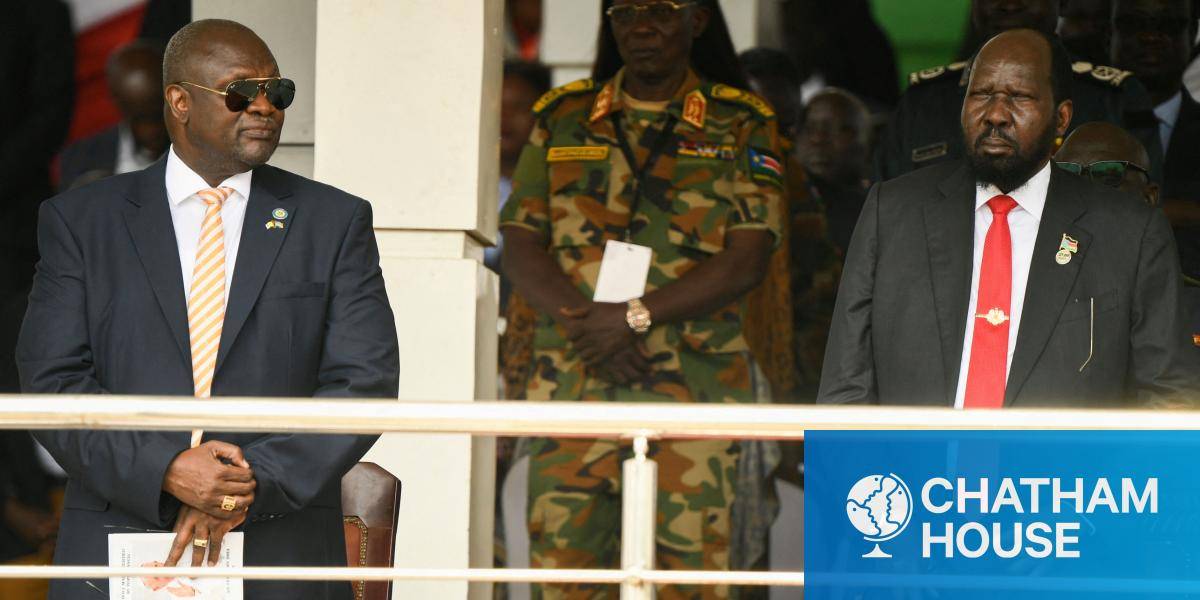
South Sudan's civil war ended in 2018 through a peace agreement between President Salva Kiir's South Sudan People's Liberation Movement In Government (SPLM-IG) and Riek Machar's Sudan People's Liberation Movement In Opposition (SPLM-IO). This agreement is now being strained to breaking point by clashes between government and opposition forces, the arrest of prominent political figures – including Machar himself – and the spillover of conflict from Sudan.
Implementation of the peace agreement was sluggish....Kiir's government used this time to consolidate power and sideline the opposition.
The head of the UN peacekeeping mission in South Sudan has warned that the country is teetering on the brink of a return to full-scale civil war , which would have a devastating impact on the entire region.
As the two SPLM factions are closely aligned with South Sudan's two largest ethnic groups – Kiir with the Dinka and Machar with the Nuer – ethnic violence could escalate. South Sudan also risks being drawn into wider geopolitical tensions linked to external support for Sudan's warring factions, notably around the role of the UAE, in addition to Ugandan military deployment in South Sudan.
How did the current crisis arise?
Implementation of the peace agreement was sluggish. It took two years to establish a national unity government, while the formation of a national army, constitution-making and preparations for national elections moved even slower, with elections repeatedly postponed. While the ceasefire largely held, inter-communal violence and clashes between government forces, ethnic militias and opposition groups continued in several parts of the country.
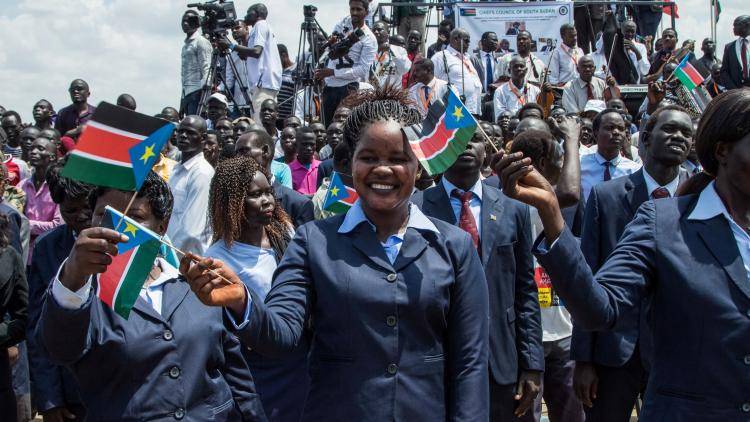
Related content
Will South Sudan's New Peace Deal Stick?
Kiir's government used this time to consolidate power and sideline the opposition, including the recent dismissal or arrest of opposition politicians and the unilateral removal of SPLM-IO state governors, while quietly abandoning its commitment to security sector reform.
These political manoeuvres have increased speculation over who will succeed the 73-year-old Kiir, who is believed to be in declining health.
The businessman Benjamin Bol Mel is widely believed to be Kiir's chosen successor, despite his lack of a political, military or geographical power base – and it seems Kiir is removing anyone who might oppose this plan.
After announcing the latest election postponement in September 2024, he dismissed several security chiefs and senior members of the government in quick succession and in February 2025 he removed two of the five vice presidents. Bol Mel was subsequently appointed vice president as well as deputy chair of the SPLM, the number two position after Kiir himself.
Spillover from the war in Sudan
South Sudan has been further destabilized by spillover from the war in Sudan, including an influx of weapons and people – mainly South Sudanese returnees – and the recruitment of South Sudanese fighters by both sides in the war. Reports of clashes between RSF fighters and SPLM-IO forces in Upper Nile, and suspicions that the Sudanese Armed Forces (SAF) has reactivated its ties to Nuer militias , have heightened concerns.
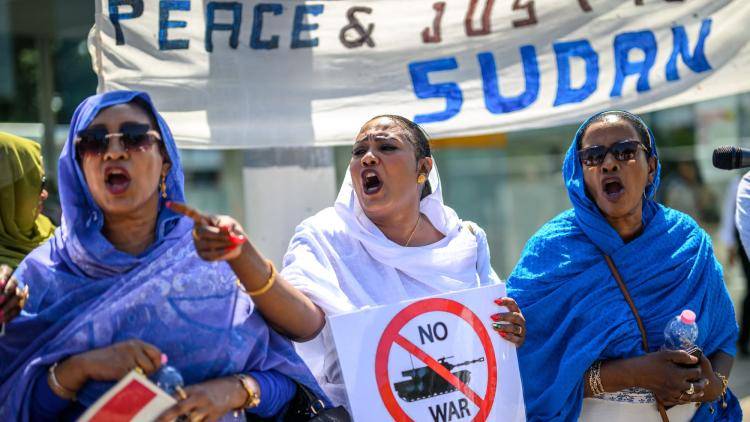
Related content
The war in Sudan is intensifying. Coordinated pressure is needed to prevent the country's fragmentation
Since the start of the war in Sudan in April 2023, President Kiir has walked a tightrope between the two belligerents, the Rapid Support Forces (RSF) and the SAF. South Sudan needs to export its oil through Sudanese territory to Port Sudan, relying on pipelines going through areas held by the two warring parties.
Although Kiir was initially seen as more closely aligned with the SAF, economic difficulties have seen him forge closer ties with the UAE, widely regarded as the main sponsor of the RSF .
Bol Mel has been one of Kiir's main negotiators with the UAE and his elevation came immediately after Kiir's return from the UAE in February, as did the removal of SAF-aligned Tut Gatluak, the former national security adviser.
Local clashes and national escalation
In March 2025, an independent Nuer militia intermittently aligned with Machar's SPLM-IO overran an army base in Nasir in Upper Nile state over fears that the garrison was about to be replaced by forces from rival communities. The government responded with air strikes on Nasir, causing civilian casualties and widespread displacement.
Seen as the only legal framework for holding elections, the peace agreement has the continued support of the international community.
Violence subsequently spread across the country, with widespread clashes between opposition and government forces, air strikes on SPLM-IO positions outside the capital Juba and escalating inter-ethnic clashes in Western Equatoria. Kiir also called in Ugandan special forces to reinforce his own troops.
Following the attacks in Nasir, security forces arrested several of Machar's senior allies, including the minister of petroleum, and placed Machar himself under house arrest. Kiir has accused Machar of helping to orchestrate the attacks, a claim denied by SPLM-IO, which has in turn blamed Kiir's government for systematically undermining the peace agreement.
Machar has been weakened both militarily and politically since 2018 and is unlikely to threaten a meaningful response unless sustained government violence unifies the ethnic Nuer opposition.
What can be done to de-escalate the crisis?
Until recently, South Sudan had fallen off the international radar. But, since early March, there has been a flurry of high-level diplomatic activity by the UN , the AU Panel of the Wise, the East African Community, and regional leaders from Kenya , Uganda and Ethiopia to try to de-escalate tensions. Western diplomats in Juba and local church leaders have also appealed for dialogue. Kiir is reported to have assured his key ally, Ugandan President Museveni, that he remains committed to the peace agreement.
Source: https://www.chathamhouse.org/2025/04/south-sudans-shaky-peace-risk-collapse-can-it-be-saved Apr 09, 2025, 07:38 AM
South Sudan's shaky peace is at risk of collapse. Can it be saved?
Expert comment
LToremark
9 April 2025
Recent events have undermined the 2018 peace agreement, raising questions over whether the deal can be resuscitated or if a new way forward is needed.

South Sudan's civil war ended in 2018 through a peace agreement between President Salva Kiir's South Sudan People's Liberation Movement In Government (SPLM-IG) and Riek Machar's Sudan People's Liberation Movement In Opposition (SPLM-IO). This agreement is now being strained to breaking point by clashes between government and opposition forces, the arrest of prominent political figures – including Machar himself – and the spillover of conflict from Sudan.
Implementation of the peace agreement was sluggish....Kiir's government used this time to consolidate power and sideline the opposition.
The head of the UN peacekeeping mission in South Sudan has warned that the country is teetering on the brink of a return to full-scale civil war , which would have a devastating impact on the entire region.
As the two SPLM factions are closely aligned with South Sudan's two largest ethnic groups – Kiir with the Dinka and Machar with the Nuer – ethnic violence could escalate. South Sudan also risks being drawn into wider geopolitical tensions linked to external support for Sudan's warring factions, notably around the role of the UAE, in addition to Ugandan military deployment in South Sudan.
How did the current crisis arise?
Implementation of the peace agreement was sluggish. It took two years to establish a national unity government, while the formation of a national army, constitution-making and preparations for national elections moved even slower, with elections repeatedly postponed. While the ceasefire largely held, inter-communal violence and clashes between government forces, ethnic militias and opposition groups continued in several parts of the country.

Related content
Will South Sudan's New Peace Deal Stick?
Kiir's government used this time to consolidate power and sideline the opposition, including the recent dismissal or arrest of opposition politicians and the unilateral removal of SPLM-IO state governors, while quietly abandoning its commitment to security sector reform.
These political manoeuvres have increased speculation over who will succeed the 73-year-old Kiir, who is believed to be in declining health.
The businessman Benjamin Bol Mel is widely believed to be Kiir's chosen successor, despite his lack of a political, military or geographical power base – and it seems Kiir is removing anyone who might oppose this plan.
After announcing the latest election postponement in September 2024, he dismissed several security chiefs and senior members of the government in quick succession and in February 2025 he removed two of the five vice presidents. Bol Mel was subsequently appointed vice president as well as deputy chair of the SPLM, the number two position after Kiir himself.
Spillover from the war in Sudan
South Sudan has been further destabilized by spillover from the war in Sudan, including an influx of weapons and people – mainly South Sudanese returnees – and the recruitment of South Sudanese fighters by both sides in the war. Reports of clashes between RSF fighters and SPLM-IO forces in Upper Nile, and suspicions that the Sudanese Armed Forces (SAF) has reactivated its ties to Nuer militias , have heightened concerns.

Related content
The war in Sudan is intensifying. Coordinated pressure is needed to prevent the country's fragmentation
Since the start of the war in Sudan in April 2023, President Kiir has walked a tightrope between the two belligerents, the Rapid Support Forces (RSF) and the SAF. South Sudan needs to export its oil through Sudanese territory to Port Sudan, relying on pipelines going through areas held by the two warring parties.
Although Kiir was initially seen as more closely aligned with the SAF, economic difficulties have seen him forge closer ties with the UAE, widely regarded as the main sponsor of the RSF .
Bol Mel has been one of Kiir's main negotiators with the UAE and his elevation came immediately after Kiir's return from the UAE in February, as did the removal of SAF-aligned Tut Gatluak, the former national security adviser.
Local clashes and national escalation
In March 2025, an independent Nuer militia intermittently aligned with Machar's SPLM-IO overran an army base in Nasir in Upper Nile state over fears that the garrison was about to be replaced by forces from rival communities. The government responded with air strikes on Nasir, causing civilian casualties and widespread displacement.
Seen as the only legal framework for holding elections, the peace agreement has the continued support of the international community.
Violence subsequently spread across the country, with widespread clashes between opposition and government forces, air strikes on SPLM-IO positions outside the capital Juba and escalating inter-ethnic clashes in Western Equatoria. Kiir also called in Ugandan special forces to reinforce his own troops.
Following the attacks in Nasir, security forces arrested several of Machar's senior allies, including the minister of petroleum, and placed Machar himself under house arrest. Kiir has accused Machar of helping to orchestrate the attacks, a claim denied by SPLM-IO, which has in turn blamed Kiir's government for systematically undermining the peace agreement.
Machar has been weakened both militarily and politically since 2018 and is unlikely to threaten a meaningful response unless sustained government violence unifies the ethnic Nuer opposition.
What can be done to de-escalate the crisis?
Until recently, South Sudan had fallen off the international radar. But, since early March, there has been a flurry of high-level diplomatic activity by the UN , the AU Panel of the Wise, the East African Community, and regional leaders from Kenya , Uganda and Ethiopia to try to de-escalate tensions. Western diplomats in Juba and local church leaders have also appealed for dialogue. Kiir is reported to have assured his key ally, Ugandan President Museveni, that he remains committed to the peace agreement.
Source: https://www.chathamhouse.org/2025/04/south-sudans-shaky-peace-risk-collapse-can-it-be-saved Apr 09, 2025, 07:38 AM
#35
General Non-Music Discussion / Trump’s tariffs will push Sou...
Last post by jon.wallace - May 07, 2025, 01:48 AMTrump's tariffs will push Southeast Asia uncomfortably close to China
Trump's tariffs will push Southeast Asia uncomfortably close to China
Expert comment
jon.wallace
8 April 2025
ASEAN countries fear being caught in a US–China trade war – punished by US tariffs while being flooded with Chinese goods. They will need to band together to preserve their impressive economies.
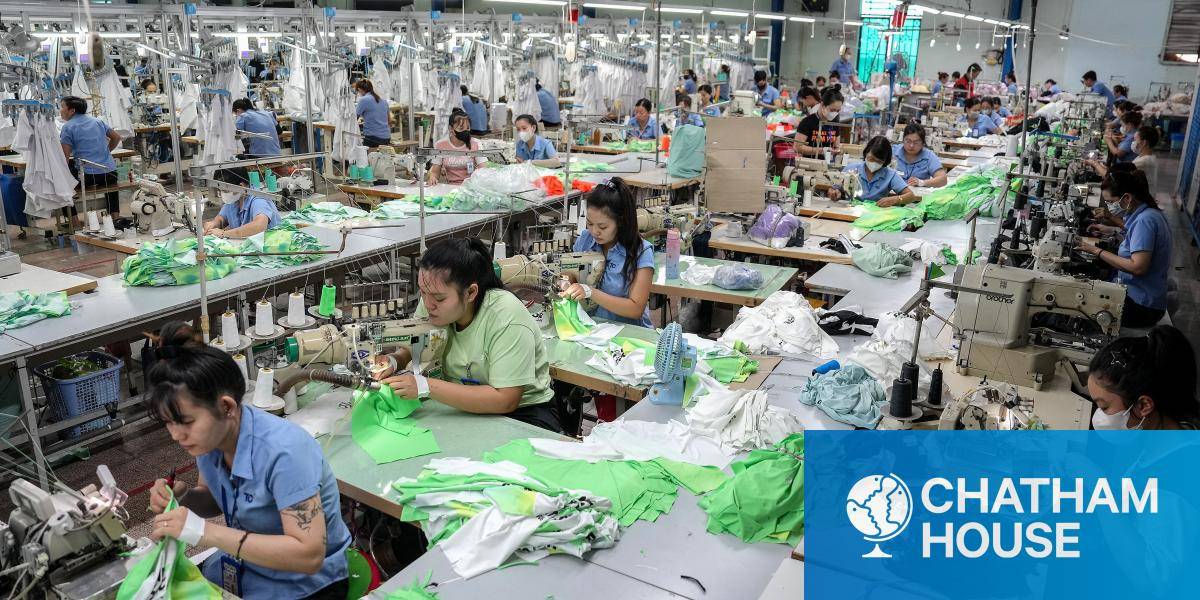
Southeast Asian leaders have long argued that they should not have to choose sides between the US and China. Indeed, trading nations such as Malaysia and Vietnam have arguably profited from heightened China–US rivalry over the last few years, attracting manufacturers keen to diversify away from China in order to maintain access to the US market.
Beijing has long been the major target of US President Donald Trump's opprobrium on trade. However, Trump's so-called reciprocal tariffs, announced on 2 April, have hit Southeast Asia particularly hard, throwing countries' short-term economic plans into disarray, undermining the basis of their long-term development models, and pushing them further into an uncomfortable embrace with China, their largest trading partner.
Many regional officials feel they are being unfairly punished for helping American companies shift their production out of China.
Southeast Asian governments were shocked to be targeted with tariff rates similar to or higher than China's 34 per cent, from Cambodia (at 49 per cent) to Vietnam (at 46 per cent) and Indonesia (at 32 per cent). Many regional officials feel they are being unfairly punished for helping American companies shift their production out of China , in line with Washington's call for de-risking of US supply chains.
China's positioning
Even as it frets about the impact on its own economy, Beijing is seeking to make political capital from Trump's missteps. China is positioning itself to Southeast Asia, and the rest of the world, as the responsible defender of the global trading system and rules-based order, in contrast to American unilateralism and economic coercion.
Xi Jinping...wants to see greater economic integration with Southeast Asia and more market access for Chinese companies.
Xi Jinping, the General Secretary of the Chinese Communist Party, is likely to emphasize that message if he proceeds with a possible visit to Cambodia, Malaysia and Vietnam later this month.
As China and its neighbours risk being squeezed out of the US market, he wants to see greater economic integration with Southeast Asia and more market access for Chinese companies. Xi will also advance his vision of an 'Asia for Asians', where China dominates and the US is marginalized.
His Southeast Asian counterparts will be receptive to the economic offer but wary of the broader strategic implications. Frustration with the US runs deep in Southeast Asia, but there is justified concern about Beijing's response to the intensifying trade and technology war, and how it will affect the region.
Southeast Asian government officials and local manufacturers fear that Chinese factories will flood their markets with cheap goods, seeking alternatives to the heavily tariffed US. They also worry that Beijing will have the financial firepower to support its industries through a period of trade war, while their own fiscally and monetarily constrained governments will struggle.
And they are concerned that a broader breakdown of the open global trading system will irreparably harm their development models. All are based on integrating production with China and exporting to the US, Europe and other advanced economies.
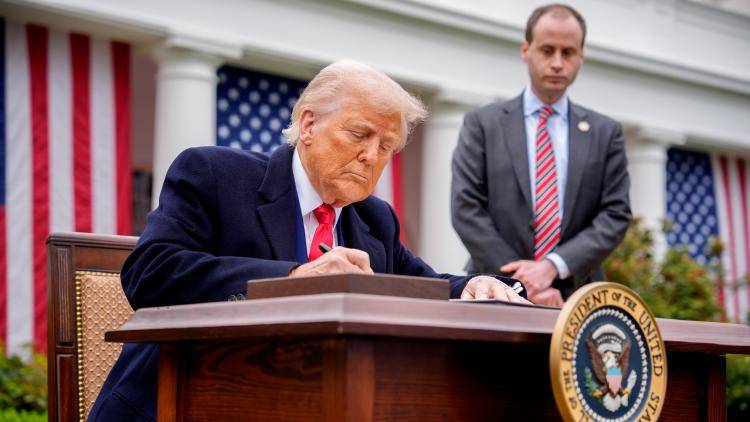
Related content
Independent Thinking: Are Donald Trump's tariffs the end of globalization?
The trajectory of the trade and technology war in Southeast Asia will have major global implications. The regional body, the Association of Southeast Asian Nations (ASEAN), is not as integrated as the European Union . But taken together it represents the world's fifth biggest economy, with 680 million people.
Southeast Asia has become an increasingly important connector in global supply chains, producing semiconductors for Intel, high-end trainers for Nike and smartphones for Samsung, among other goods.
Geopolitically, the region has become the main crucible for competition between China, on one hand, and the US and its allies on the other. Territorial and sovereignty disputes over the South China Sea and Taiwan are shaping the nature of economic competition and cooperation in the region, and vice versa. And the extent and character of China's rise will be determined, in many ways, by the conduct of its relationships with its Asian neighbours.
Source: https://www.chathamhouse.org/2025/04/trumps-tariffs-will-push-southeast-asia-uncomfortably-close-china Apr 08, 2025, 11:45 AM
Trump's tariffs will push Southeast Asia uncomfortably close to China
Expert comment
jon.wallace
8 April 2025
ASEAN countries fear being caught in a US–China trade war – punished by US tariffs while being flooded with Chinese goods. They will need to band together to preserve their impressive economies.

Southeast Asian leaders have long argued that they should not have to choose sides between the US and China. Indeed, trading nations such as Malaysia and Vietnam have arguably profited from heightened China–US rivalry over the last few years, attracting manufacturers keen to diversify away from China in order to maintain access to the US market.
Beijing has long been the major target of US President Donald Trump's opprobrium on trade. However, Trump's so-called reciprocal tariffs, announced on 2 April, have hit Southeast Asia particularly hard, throwing countries' short-term economic plans into disarray, undermining the basis of their long-term development models, and pushing them further into an uncomfortable embrace with China, their largest trading partner.
Many regional officials feel they are being unfairly punished for helping American companies shift their production out of China.
Southeast Asian governments were shocked to be targeted with tariff rates similar to or higher than China's 34 per cent, from Cambodia (at 49 per cent) to Vietnam (at 46 per cent) and Indonesia (at 32 per cent). Many regional officials feel they are being unfairly punished for helping American companies shift their production out of China , in line with Washington's call for de-risking of US supply chains.
China's positioning
Even as it frets about the impact on its own economy, Beijing is seeking to make political capital from Trump's missteps. China is positioning itself to Southeast Asia, and the rest of the world, as the responsible defender of the global trading system and rules-based order, in contrast to American unilateralism and economic coercion.
Xi Jinping...wants to see greater economic integration with Southeast Asia and more market access for Chinese companies.
Xi Jinping, the General Secretary of the Chinese Communist Party, is likely to emphasize that message if he proceeds with a possible visit to Cambodia, Malaysia and Vietnam later this month.
As China and its neighbours risk being squeezed out of the US market, he wants to see greater economic integration with Southeast Asia and more market access for Chinese companies. Xi will also advance his vision of an 'Asia for Asians', where China dominates and the US is marginalized.
His Southeast Asian counterparts will be receptive to the economic offer but wary of the broader strategic implications. Frustration with the US runs deep in Southeast Asia, but there is justified concern about Beijing's response to the intensifying trade and technology war, and how it will affect the region.
Southeast Asian government officials and local manufacturers fear that Chinese factories will flood their markets with cheap goods, seeking alternatives to the heavily tariffed US. They also worry that Beijing will have the financial firepower to support its industries through a period of trade war, while their own fiscally and monetarily constrained governments will struggle.
And they are concerned that a broader breakdown of the open global trading system will irreparably harm their development models. All are based on integrating production with China and exporting to the US, Europe and other advanced economies.

Related content
Independent Thinking: Are Donald Trump's tariffs the end of globalization?
The trajectory of the trade and technology war in Southeast Asia will have major global implications. The regional body, the Association of Southeast Asian Nations (ASEAN), is not as integrated as the European Union . But taken together it represents the world's fifth biggest economy, with 680 million people.
Southeast Asia has become an increasingly important connector in global supply chains, producing semiconductors for Intel, high-end trainers for Nike and smartphones for Samsung, among other goods.
Geopolitically, the region has become the main crucible for competition between China, on one hand, and the US and its allies on the other. Territorial and sovereignty disputes over the South China Sea and Taiwan are shaping the nature of economic competition and cooperation in the region, and vice versa. And the extent and character of China's rise will be determined, in many ways, by the conduct of its relationships with its Asian neighbours.
Source: https://www.chathamhouse.org/2025/04/trumps-tariffs-will-push-southeast-asia-uncomfortably-close-china Apr 08, 2025, 11:45 AM
#36
General Non-Music Discussion / What does a hostile US mean f...
Last post by Anonymous - May 07, 2025, 01:48 AMWhat does a hostile US mean for Canada's next Prime Minister?
What does a hostile US mean for Canada's next Prime Minister?
24
April 2025 — 2:00PM TO 3:00PM
Anonymous (not verified)
8 April 2025
Online
As Canadians head to the polls, experts examine how the US–Canada relationship might change.
As Canadians head to the polls, experts look at how the US-Canada relationship will change with a new government.
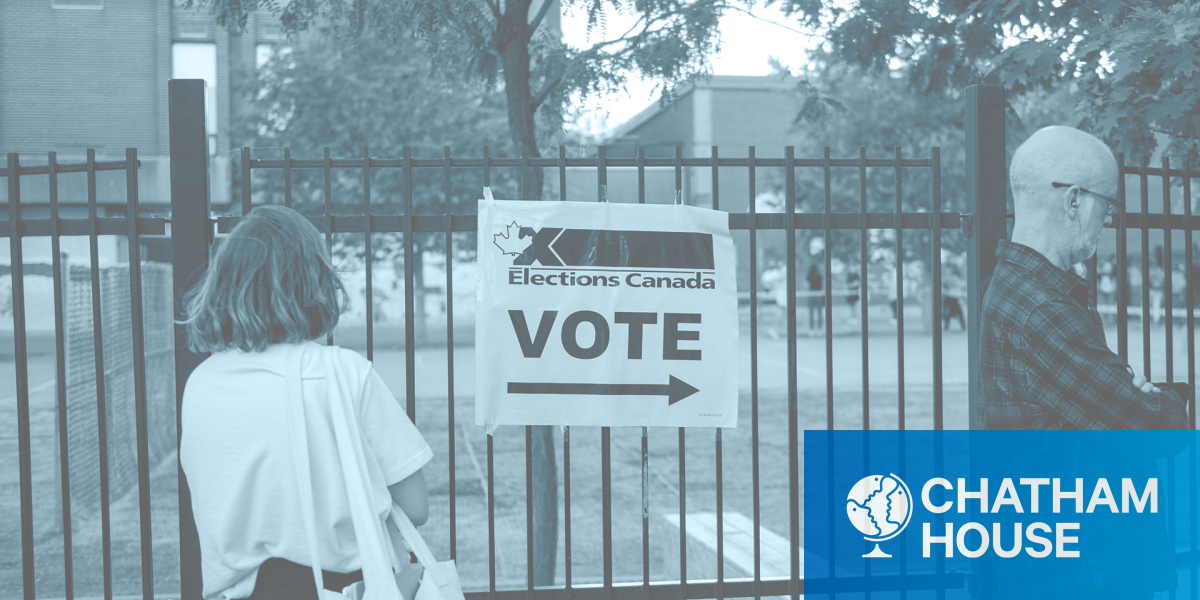
As Canada approaches a pivotal federal election, the trajectory of US–Canada relations stands at a critical juncture. From trade and energy cooperation to defence partnerships and shared democratic values, the bilateral relationship is deeply rooted, but facing unprecedented challenge. From Trump's hefty tariffs to threats to subsume Canada into the '51st state', this new and destabilising relationship with the United States has upended the status quo.
Join us as experts delve into key questions including:
Source: https://www.chathamhouse.org/events/all/open-event/what-does-hostile-us-mean-canadas-next-prime-minister Apr 08, 2025, 03:12 AM
What does a hostile US mean for Canada's next Prime Minister?
24
April 2025 — 2:00PM TO 3:00PM
Anonymous (not verified)
8 April 2025
Online
As Canadians head to the polls, experts examine how the US–Canada relationship might change.
As Canadians head to the polls, experts look at how the US-Canada relationship will change with a new government.

As Canada approaches a pivotal federal election, the trajectory of US–Canada relations stands at a critical juncture. From trade and energy cooperation to defence partnerships and shared democratic values, the bilateral relationship is deeply rooted, but facing unprecedented challenge. From Trump's hefty tariffs to threats to subsume Canada into the '51st state', this new and destabilising relationship with the United States has upended the status quo.
Join us as experts delve into key questions including:
- What can we expect from the election results?
- How will Canada's foreign policy evolve under a new government, especially in relation to the US and Europe?
- How does a new government handle the Trump administration moving forward?
Source: https://www.chathamhouse.org/events/all/open-event/what-does-hostile-us-mean-canadas-next-prime-minister Apr 08, 2025, 03:12 AM
#37
General Non-Music Discussion / In conversation with Senator ...
Last post by Anonymous - May 07, 2025, 01:48 AMIn conversation with Senator Ruben Gallego
In conversation with Senator Ruben Gallego
15
April 2025 — 6:00PM TO 7:00PM
Anonymous (not verified)
7 April 2025
Chatham House and Online
Senator Gallego calls for the US to retain its role as a world leader by engaging with partners and allies.
Senator Gallego calls for the US to retain its role as a world leader by engaging with partners and allies.
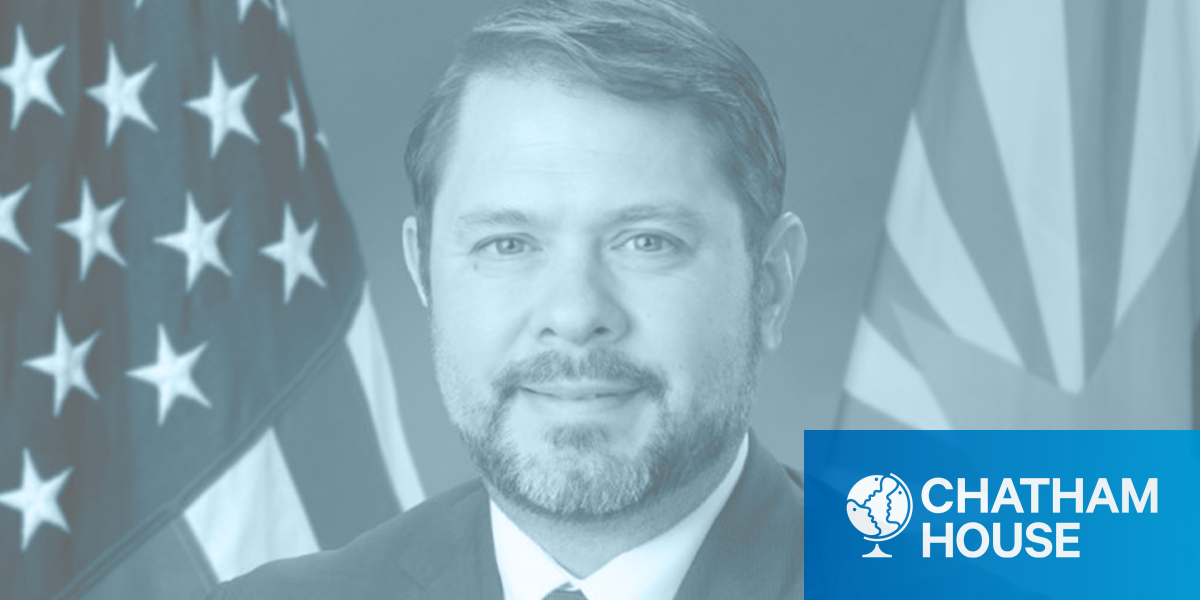
Abrupt shifts in US foreign policy since President Donald Trump returned to the White House have rocked international institutions, impacted global markets and worried America's allies.
The administration's tariff policy and withdrawal from multilateral organisations has upended decades of America's approach to global affairs. The dramatic downsizing of the US role in Europe's security and defence infrastructure, and notably the changed position towards the war in Ukraine from the previous administration, has been stark and significant. Friendly nations have reeled at the tone and speed of the switch, as the President has made clear his intention to pursue the 'America First' agenda.
However, as America retreats from its traditionally held positions around the world, many in Congress are still keen for America to retain its position as a stable and dependable ally, with many advocating for renewed commitments and engagements with multilateral institutions and to work with partners on the biggest global challenges of the day.
Join us at Chatham House to hear Senator Gallego discuss his views on the importance of America returning to its role as a guarantor of security, working with allies and supporting multilateral efforts to address international flashpoints from Ukraine and Gaza to climate action and AI.
By registering for this event, attendees agree toour code of conduct, ensuring a respectful, inclusive, and welcoming space for diverse perspectives and debate.
Please note that in person guests may have their details shared with security for this event.
Source: https://www.chathamhouse.org/events/all/special-event/conversation-senator-ruben-gallego Apr 07, 2025, 11:27 AM
In conversation with Senator Ruben Gallego
15
April 2025 — 6:00PM TO 7:00PM
Anonymous (not verified)
7 April 2025
Chatham House and Online
Senator Gallego calls for the US to retain its role as a world leader by engaging with partners and allies.
Senator Gallego calls for the US to retain its role as a world leader by engaging with partners and allies.

Abrupt shifts in US foreign policy since President Donald Trump returned to the White House have rocked international institutions, impacted global markets and worried America's allies.
The administration's tariff policy and withdrawal from multilateral organisations has upended decades of America's approach to global affairs. The dramatic downsizing of the US role in Europe's security and defence infrastructure, and notably the changed position towards the war in Ukraine from the previous administration, has been stark and significant. Friendly nations have reeled at the tone and speed of the switch, as the President has made clear his intention to pursue the 'America First' agenda.
However, as America retreats from its traditionally held positions around the world, many in Congress are still keen for America to retain its position as a stable and dependable ally, with many advocating for renewed commitments and engagements with multilateral institutions and to work with partners on the biggest global challenges of the day.
Join us at Chatham House to hear Senator Gallego discuss his views on the importance of America returning to its role as a guarantor of security, working with allies and supporting multilateral efforts to address international flashpoints from Ukraine and Gaza to climate action and AI.
By registering for this event, attendees agree toour code of conduct, ensuring a respectful, inclusive, and welcoming space for diverse perspectives and debate.
Please note that in person guests may have their details shared with security for this event.
Source: https://www.chathamhouse.org/events/all/special-event/conversation-senator-ruben-gallego Apr 07, 2025, 11:27 AM
#38
General Non-Music Discussion / On ‘liberation day’, Presiden...
Last post by jon.wallace - May 07, 2025, 01:48 AMOn 'liberation day', President Trump revealed America's strategic vulnerabilities
On 'liberation day', President Trump revealed America's strategic vulnerabilities
Expert comment
jon.wallace
7 April 2025
By exempting certain critical minerals from his latest tariffs, Trump has demonstrated the fragile interdependence underpinning modern industrial economies – and provided a wake-up call for the EU and UK.
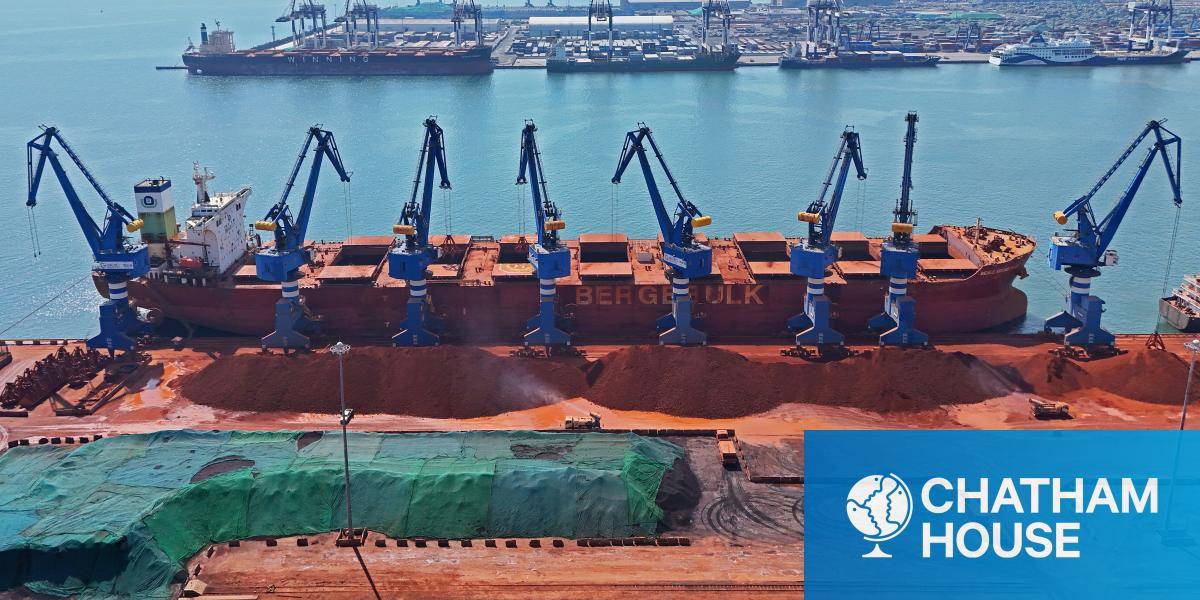
Beyond the shock of its sheer scale, the Trump administration's extraordinary new tariff regime, announced on 2 April 2025, was notable for the exemptions it contained. Certain critical minerals – including rare earths like Yttrium that is used in permanent magnets, or gallium for microchips – are exempt from the tariffs, whether imported from China or elsewhere.

Related content
Independent Thinking: Are Donald Trump's tariffs the end of globalization?
With this carve-out, President Donald Trump revealed both an important strategic through line in his seemingly erratic policymaking, and a vulnerability. Even within this new aggressive protectionist framework, the US is compelled to recognize its continuing dependence on Chinese-dominated critical mineral supply chains that are essential to high-tech manufacturing, AI development, defence technology and the clean energy transition.
The Annex II list published by the White House exempts critical minerals, semiconductors and other strategic energy-related tech from the new tariff regime. The critical minerals exemption, (especially for imports of rare earths elements, but also battery metals such as cobalt and lithium and base metals such as copper and aluminium) underscores the reality: the US cannot afford to disrupt these flows without jeopardizing its own economic and technological ambitions. It seems that even for the Trump administration there are limits to economic nationalism.
China's response
This exemption has not gone unnoticed by China. Beijing has retaliated not only with a 34 per cent tariff on US products , but also new export controls on rare earth elements as well as permanent magnets (used in electronic equipment, motors, and wind turbines).
These export controls kicked in on 4 April. The China Nonferrous Metals Industry Association stated that the export controls on rare earths will not affect the stability of international supply chains. But the impact will likely be felt well beyond the US. It will ripple across global technology value chains, potentially throttling production in economies like Japan, South Korea, the EU and the UK.
90%
Amount of world's rare earth elements processed by China.
While it is not known if Trump expected this response from Beijing, his administration is taking measures to reduce reliance on China, which controls 69 per cent of global rare earth production and over 90 per cent of global processing capacity.
Trump issued an executive order on 20 March titled 'Immediate Measures to Increase American Mineral Production ' aiming to increase domestic mining. In parallel, the US is negotiating a minerals deal with the Democratic Republic of Congo – the world's largest producer of cobalt, much of which is also controlled by China.
But these measures will not address the dominance of Chinese companies in the short-term. While efforts to diversify supply chains are underway, this transition will take time and the US will remain exposed to Beijing's influence through its overseas investments and control of mineral processing. In the meantime, a trade war risks disrupting the highly interconnected and globalized nature of mineral extraction, refining, and the technology value chains built around them, potentially creating more instability than strategic advantage.
Cascading unintended consequences
A critical risk in this looming trade war is the cascade of unintended consequences, where measures aimed at a single adversary provoke disruptions far beyond the original scope. In this case, China's export controls on rare earths are not limited to the US. They could affect other global buyers, sparking uncertainty in a sector already vulnerable to concentration risk.
In a globally interconnected economy, aggressive unilateral actions and reactions can provoke systemic shocks.
Trump's tariffs on the one side, and China's retaliatory export controls on rare earths on the other, are a reminder that in a globally interconnected economy, aggressive unilateral actions and reactions can provoke systemic shocks that harm not just adversaries, but allies and domestic industries alike.
This could have several knock-on effects. Prices could become volatile for rare earth-dependent industries. Sectors like renewable energy manufacturing, aerospace and electronics could face delays or increased costs. And strategic stockpiling by countries and major companies could accelerate, further tightening global supply by pulling more material out of circulation than is immediately needed.
Implications for Europe and the UK
For Europe and the UK, this should be a wake-up call. Diversifying supply chains, investing in domestic capabilities, driving a circular economy of critical raw materials and building strategic partnerships beyond China and the US are no longer just long-term goals. They have become urgent economic and geopolitical imperatives.
If critical raw material prices spike, European manufacturers – particularly in Germany and the UK – could face sharply rising input costs, further eroding industrial competitiveness at a critical moment. Both countries are already grappling with sluggish economic performance and stagflation, having recorded close to zero growth so far in 2025.
Disruptions in supply...could slow deployment timelines for clean energy technologies (and) threaten emissions targets ahead of COP30.
EU and UK climate targets could also be impacted. Europe's Green Deal and the UK's Net Zero targets hinge on steady access to critical minerals for wind turbines, EVs, and battery storage. Disruptions in supply or rising costs could slow deployment timelines for clean energy technologies, threaten emissions targets ahead of COP30, and increase dependency on fossil fuels in the interim.
Source: https://www.chathamhouse.org/2025/04/liberation-day-president-trump-revealed-americas-strategic-vulnerabilities Apr 07, 2025, 10:47 AM
On 'liberation day', President Trump revealed America's strategic vulnerabilities
Expert comment
jon.wallace
7 April 2025
By exempting certain critical minerals from his latest tariffs, Trump has demonstrated the fragile interdependence underpinning modern industrial economies – and provided a wake-up call for the EU and UK.

Beyond the shock of its sheer scale, the Trump administration's extraordinary new tariff regime, announced on 2 April 2025, was notable for the exemptions it contained. Certain critical minerals – including rare earths like Yttrium that is used in permanent magnets, or gallium for microchips – are exempt from the tariffs, whether imported from China or elsewhere.

Related content
Independent Thinking: Are Donald Trump's tariffs the end of globalization?
With this carve-out, President Donald Trump revealed both an important strategic through line in his seemingly erratic policymaking, and a vulnerability. Even within this new aggressive protectionist framework, the US is compelled to recognize its continuing dependence on Chinese-dominated critical mineral supply chains that are essential to high-tech manufacturing, AI development, defence technology and the clean energy transition.
The Annex II list published by the White House exempts critical minerals, semiconductors and other strategic energy-related tech from the new tariff regime. The critical minerals exemption, (especially for imports of rare earths elements, but also battery metals such as cobalt and lithium and base metals such as copper and aluminium) underscores the reality: the US cannot afford to disrupt these flows without jeopardizing its own economic and technological ambitions. It seems that even for the Trump administration there are limits to economic nationalism.
China's response
This exemption has not gone unnoticed by China. Beijing has retaliated not only with a 34 per cent tariff on US products , but also new export controls on rare earth elements as well as permanent magnets (used in electronic equipment, motors, and wind turbines).
These export controls kicked in on 4 April. The China Nonferrous Metals Industry Association stated that the export controls on rare earths will not affect the stability of international supply chains. But the impact will likely be felt well beyond the US. It will ripple across global technology value chains, potentially throttling production in economies like Japan, South Korea, the EU and the UK.
90%
Amount of world's rare earth elements processed by China.
While it is not known if Trump expected this response from Beijing, his administration is taking measures to reduce reliance on China, which controls 69 per cent of global rare earth production and over 90 per cent of global processing capacity.
Trump issued an executive order on 20 March titled 'Immediate Measures to Increase American Mineral Production ' aiming to increase domestic mining. In parallel, the US is negotiating a minerals deal with the Democratic Republic of Congo – the world's largest producer of cobalt, much of which is also controlled by China.
But these measures will not address the dominance of Chinese companies in the short-term. While efforts to diversify supply chains are underway, this transition will take time and the US will remain exposed to Beijing's influence through its overseas investments and control of mineral processing. In the meantime, a trade war risks disrupting the highly interconnected and globalized nature of mineral extraction, refining, and the technology value chains built around them, potentially creating more instability than strategic advantage.
Cascading unintended consequences
A critical risk in this looming trade war is the cascade of unintended consequences, where measures aimed at a single adversary provoke disruptions far beyond the original scope. In this case, China's export controls on rare earths are not limited to the US. They could affect other global buyers, sparking uncertainty in a sector already vulnerable to concentration risk.
In a globally interconnected economy, aggressive unilateral actions and reactions can provoke systemic shocks.
Trump's tariffs on the one side, and China's retaliatory export controls on rare earths on the other, are a reminder that in a globally interconnected economy, aggressive unilateral actions and reactions can provoke systemic shocks that harm not just adversaries, but allies and domestic industries alike.
This could have several knock-on effects. Prices could become volatile for rare earth-dependent industries. Sectors like renewable energy manufacturing, aerospace and electronics could face delays or increased costs. And strategic stockpiling by countries and major companies could accelerate, further tightening global supply by pulling more material out of circulation than is immediately needed.
Implications for Europe and the UK
For Europe and the UK, this should be a wake-up call. Diversifying supply chains, investing in domestic capabilities, driving a circular economy of critical raw materials and building strategic partnerships beyond China and the US are no longer just long-term goals. They have become urgent economic and geopolitical imperatives.
If critical raw material prices spike, European manufacturers – particularly in Germany and the UK – could face sharply rising input costs, further eroding industrial competitiveness at a critical moment. Both countries are already grappling with sluggish economic performance and stagflation, having recorded close to zero growth so far in 2025.
Disruptions in supply...could slow deployment timelines for clean energy technologies (and) threaten emissions targets ahead of COP30.
EU and UK climate targets could also be impacted. Europe's Green Deal and the UK's Net Zero targets hinge on steady access to critical minerals for wind turbines, EVs, and battery storage. Disruptions in supply or rising costs could slow deployment timelines for clean energy technologies, threaten emissions targets ahead of COP30, and increase dependency on fossil fuels in the interim.
Source: https://www.chathamhouse.org/2025/04/liberation-day-president-trump-revealed-americas-strategic-vulnerabilities Apr 07, 2025, 10:47 AM
#39
General Non-Music Discussion / Why the China-India relations...
Last post by Anonymous - May 07, 2025, 01:48 AMWhy the China-India relationship matters for the future of the global order
Why the China-India relationship matters for the future of the global order
8
May 2025 — 1:00PM TO 2:00PM
Anonymous (not verified)
4 April 2025
Chatham House and Online
Examining China and India's bilateral relationship and how the West should respond.
Examining China and India's bilateral relationship and how the West should respond.
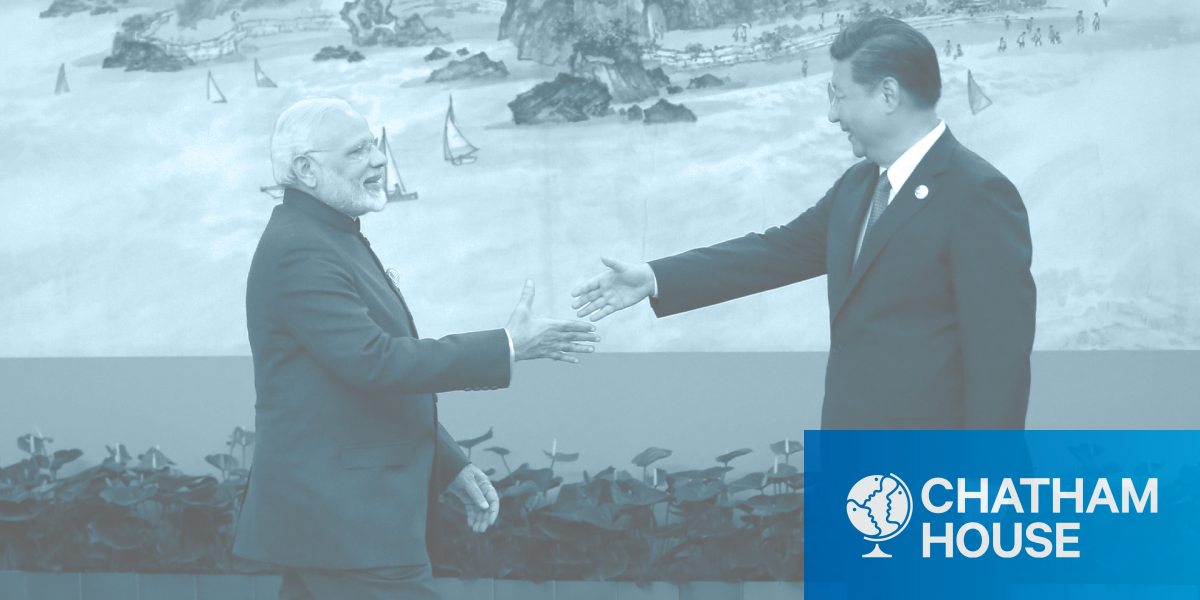
While the US–China relationship is regarded as the key defining geopolitical relationship of the 21 century, the relationship between China and India holds greater long-term significance to the emerging multipolar global order. There is a tendency to view the relationship through the narrow prism of their unresolved territorial dispute. However, this overlooks the weight of these two Asian giants – the world's most populous countries, the second and soon to be third largest economies, and self-proclaimed civilizational states and voices of the Global South. As China and India become increasingly prominent geopolitical actors, how these two countries engage and interact with one another will play a vital role in the international relations of the future.
Chatham House experts have written the first extensive paper, examining the China–India relationship by a European think tank looking the relationship from both a Chinese and Indian perspective. The findings of the paper examine how the two countries interact with and perceive each other while challenging several misconceptions about the bilateral relationship, and how the West might react to the China–India dynamic to maximise their own strategic objectives in Asia.
This panel discussion will ask key questions including:
Source: https://www.chathamhouse.org/events/all/open-event/why-china-india-relationship-matters-future-global-order Apr 04, 2025, 09:27 AM
Why the China-India relationship matters for the future of the global order
8
May 2025 — 1:00PM TO 2:00PM
Anonymous (not verified)
4 April 2025
Chatham House and Online
Examining China and India's bilateral relationship and how the West should respond.
Examining China and India's bilateral relationship and how the West should respond.

While the US–China relationship is regarded as the key defining geopolitical relationship of the 21 century, the relationship between China and India holds greater long-term significance to the emerging multipolar global order. There is a tendency to view the relationship through the narrow prism of their unresolved territorial dispute. However, this overlooks the weight of these two Asian giants – the world's most populous countries, the second and soon to be third largest economies, and self-proclaimed civilizational states and voices of the Global South. As China and India become increasingly prominent geopolitical actors, how these two countries engage and interact with one another will play a vital role in the international relations of the future.
Chatham House experts have written the first extensive paper, examining the China–India relationship by a European think tank looking the relationship from both a Chinese and Indian perspective. The findings of the paper examine how the two countries interact with and perceive each other while challenging several misconceptions about the bilateral relationship, and how the West might react to the China–India dynamic to maximise their own strategic objectives in Asia.
This panel discussion will ask key questions including:
- What is the trajectory and drivers of the bilateral relationship?
- What are the key flashpoints and watchpoints?
- How are both countries responding to geo-economic competition?
- What are the areas of convergence and divergence on issues of global governance?
- How does the China-India relationship influence western engagement and policy towards both countries?
Source: https://www.chathamhouse.org/events/all/open-event/why-china-india-relationship-matters-future-global-order Apr 04, 2025, 09:27 AM
#40
General Non-Music Discussion / Independent Thinking: Are Don...
Last post by john.pollock - May 07, 2025, 01:48 AMIndependent Thinking: Are Donald Trump's tariffs the end of globalization?
Independent Thinking: Are Donald Trump's tariffs the end of globalization?
Audio
john.pollock
4 April 2025
Jason Furman, Dame DeAnne Julius and David Lubin discuss the impact of Donald Trump's 'liberation day' tariffs on the United States and the global economy.
[soundcloud]https://w.soundcloud.com/player/?url=https%3A//api.soundcloud.com/tracks/2070759148&visual=&auto_play=false&hide_related=false&show_comments=false&show_user=false&show_reposts=false&color=%23ff5500[/soundcloud]
President Trump has unveiled sweeping new trade tariffs – but what happens next? Bronwen Maddox explores the global reaction, the economic fallout, and whether this marks the beginning of the end for globalization.
She is joined by Jason Furman , former chair of the Council of Economic Advisers under President Barack Obama, alongside Dame DeAnne Julius and David Lubin from Chatham House's Global Economy and Finance Programme.
About Independent Thinking
Independent Thinking is a weekly international affairs podcast hosted by our director Bronwen Maddox, in conversation with leading policymakers, journalists, and Chatham House experts providing insight on the latest international issues.
More ways to listen: Apple Podcasts , Spotify .
Source: https://www.chathamhouse.org/2025/04/independent-thinking-are-donald-trumps-tariffs-end-globalization Apr 04, 2025, 05:05 AM
Independent Thinking: Are Donald Trump's tariffs the end of globalization?
Audio
john.pollock
4 April 2025
Jason Furman, Dame DeAnne Julius and David Lubin discuss the impact of Donald Trump's 'liberation day' tariffs on the United States and the global economy.
[soundcloud]https://w.soundcloud.com/player/?url=https%3A//api.soundcloud.com/tracks/2070759148&visual=&auto_play=false&hide_related=false&show_comments=false&show_user=false&show_reposts=false&color=%23ff5500[/soundcloud]
President Trump has unveiled sweeping new trade tariffs – but what happens next? Bronwen Maddox explores the global reaction, the economic fallout, and whether this marks the beginning of the end for globalization.
She is joined by Jason Furman , former chair of the Council of Economic Advisers under President Barack Obama, alongside Dame DeAnne Julius and David Lubin from Chatham House's Global Economy and Finance Programme.
About Independent Thinking
Independent Thinking is a weekly international affairs podcast hosted by our director Bronwen Maddox, in conversation with leading policymakers, journalists, and Chatham House experts providing insight on the latest international issues.
More ways to listen: Apple Podcasts , Spotify .
Source: https://www.chathamhouse.org/2025/04/independent-thinking-are-donald-trumps-tariffs-end-globalization Apr 04, 2025, 05:05 AM
